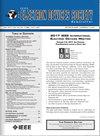Impact of Strain on Sub-3 nm Gate-All-Around CMOS Logic Circuit Performance Using a Neural Compact Modeling Approach
IF 2
3区 工程技术
Q3 ENGINEERING, ELECTRICAL & ELECTRONIC
引用次数: 0
Abstract
Impact of strain of sub-3 nm gate-all-around (GAA) CMOS transistors on the circuit performance is evaluated using a neural compact model. The model was trained using 3D technology computer-aided design (TCAD) device simulation data of GAA field-effect transistors (FETs) subjected to both tensile and compressive strain in nMOS and pMOS devices. Strain was induced into the channel via lattice mismatch between the channel and source/drain epitaxial regions, as simulated by 3D TCAD process simulator. The transport models were calibrated against advanced Monte Carlo simulations to ensure accuracy. The resulting neural compact model demonstrated a close approximation to the original simulation results, achieving a minimal error of 1%. To assess the strain effect on circuit-level performance, SPICE simulations were conducted for a 5-stage ring oscillator and a 2-input NAND gate using the neural compact model. The propagation delay of the 5-stage ring oscillator improved from 3.60 ps to 2.85 ps when implementing strained GAA FETs. Also, strain enhanced the power-delay product of the 2-input NAND gate by 13.8% to 15.5%, depending on the input voltage sequence.使用神经紧凑建模方法分析应变对 3 纳米以下栅极全方位 CMOS 逻辑电路性能的影响
使用神经紧凑模型评估了 3 纳米以下全栅极 (GAA) CMOS 晶体管应变对电路性能的影响。该模型是利用三维技术计算机辅助设计(TCAD)器件仿真数据进行训练的,这些数据是在 nMOS 和 pMOS 器件中承受拉伸和压缩应变的 GAA 场效应晶体管(FET)。应变通过沟道与源极/漏极外延区之间的晶格失配诱导到沟道中,由三维 TCAD 过程模拟器进行模拟。传输模型根据先进的蒙特卡罗模拟进行了校准,以确保准确性。结果显示,神经网络模型与原始模拟结果非常接近,误差最小为 1%。为了评估应变对电路级性能的影响,我们使用神经精简模型对 5 级环形振荡器和 2 输入 NAND 栅极进行了 SPICE 仿真。当采用应变 GAA FET 时,5 级环形振荡器的传播延迟从 3.60 ps 缩短到 2.85 ps。此外,应变还将 2 输入 NAND 栅极的功率延迟乘积提高了 13.8% 至 15.5%,具体取决于输入电压序列。
本文章由计算机程序翻译,如有差异,请以英文原文为准。
求助全文
约1分钟内获得全文
求助全文
来源期刊

IEEE Journal of the Electron Devices Society
Biochemistry, Genetics and Molecular Biology-Biotechnology
CiteScore
5.20
自引率
4.30%
发文量
124
审稿时长
9 weeks
期刊介绍:
The IEEE Journal of the Electron Devices Society (J-EDS) is an open-access, fully electronic scientific journal publishing papers ranging from fundamental to applied research that are scientifically rigorous and relevant to electron devices. The J-EDS publishes original and significant contributions relating to the theory, modelling, design, performance, and reliability of electron and ion integrated circuit devices and interconnects, involving insulators, metals, organic materials, micro-plasmas, semiconductors, quantum-effect structures, vacuum devices, and emerging materials with applications in bioelectronics, biomedical electronics, computation, communications, displays, microelectromechanics, imaging, micro-actuators, nanodevices, optoelectronics, photovoltaics, power IC''s, and micro-sensors. Tutorial and review papers on these subjects are, also, published. And, occasionally special issues with a collection of papers on particular areas in more depth and breadth are, also, published. J-EDS publishes all papers that are judged to be technically valid and original.
 求助内容:
求助内容: 应助结果提醒方式:
应助结果提醒方式:


